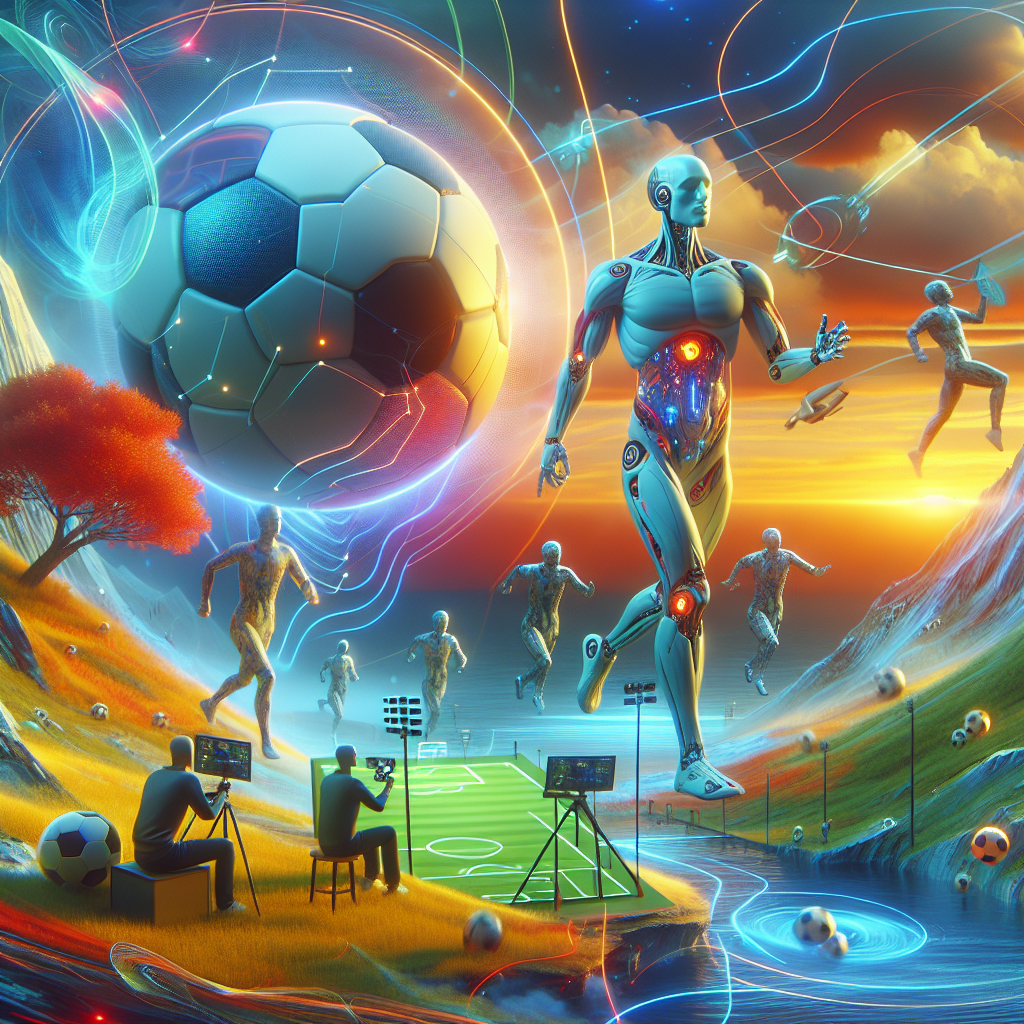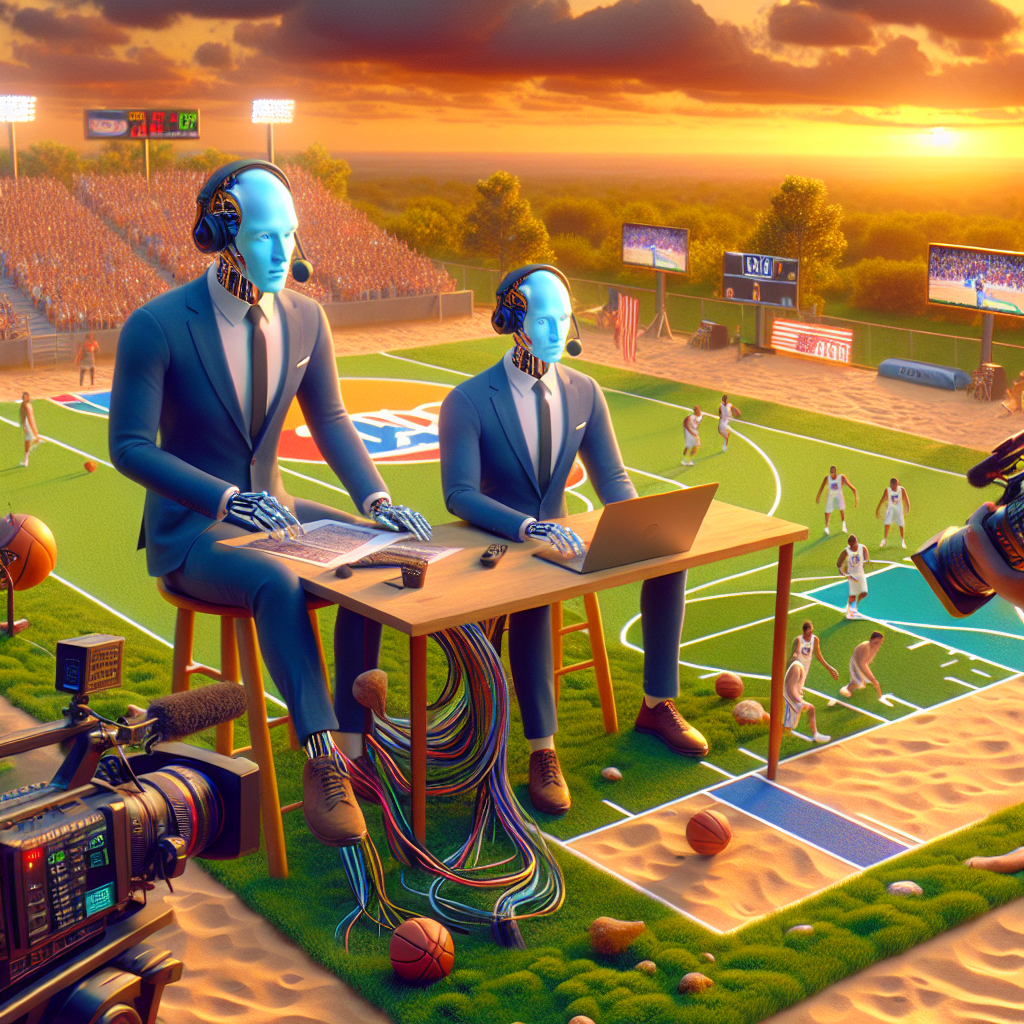AI sportcasters to debut in NCAA Season 99

Advantages of AI Sportscasters in NCAA Season 99
Artificial Intelligence (AI) technology has been making waves in various industries, and now it is set to revolutionize the world of sports broadcasting. In the upcoming NCAA Season 99, AI sportscasters will make their debut, providing fans with a new and innovative way to experience the games. While some may be skeptical about the idea of AI taking over traditional human roles, there are several advantages to having AI sportscasters in NCAA Season 99.
One of the main advantages of AI sportscasters is their ability to provide real-time analysis and insights. Unlike human sportscasters who may miss key plays or struggle to keep up with the fast-paced action, AI sportscasters can process vast amounts of data instantaneously and provide viewers with valuable information. This can enhance the viewing experience for fans, giving them a deeper understanding of the game and helping them appreciate the skill and strategy involved.
Another advantage of AI sportscasters is their consistency and reliability. Human sportscasters may have off days or make mistakes, which can impact the quality of the broadcast. AI sportscasters, on the other hand, are programmed to deliver accurate and consistent commentary every time. This ensures that viewers can rely on the AI sportscasters to provide them with a high-quality viewing experience, regardless of external factors.
Additionally, AI sportscasters have the potential to reach a wider audience. With advancements in technology, AI sportscasters can be programmed to provide commentary in multiple languages, making the games more accessible to fans around the world. This can help grow the fan base for NCAA Season 99 and increase the popularity of the sport on a global scale.
Furthermore, AI sportscasters can offer a unique perspective on the game. By analyzing data and statistics, AI sportscasters can uncover trends and patterns that may not be immediately apparent to human sportscasters. This can provide viewers with a fresh and insightful take on the game, enhancing their overall enjoyment and understanding of the sport.
Despite these advantages, some may argue that AI sportscasters lack the human touch and emotional connection that human sportscasters bring to the broadcast. While it is true that AI sportscasters may not be able to convey emotions in the same way as humans, they can still provide valuable commentary and analysis that enhances the viewing experience for fans.
In conclusion, the debut of AI sportscasters in NCAA Season 99 offers several advantages that can enhance the viewing experience for fans. From real-time analysis and insights to consistency and reliability, AI sportscasters have the potential to revolutionize the world of sports broadcasting. While they may not be able to replace human sportscasters entirely, AI sportscasters can offer a unique perspective on the game and reach a wider audience. As technology continues to advance, it will be interesting to see how AI sportscasters continue to evolve and shape the future of sports broadcasting.
Challenges Faced by AI Sportscasters in NCAA Season 99

Artificial Intelligence (AI) has been making waves in various industries, and the world of sports is no exception. In the upcoming NCAA Season 99, AI sportscasters are set to make their debut, providing real-time commentary and analysis of games. While this technological advancement is exciting, it also comes with its own set of challenges.
One of the main challenges faced by AI sportscasters is the ability to accurately interpret and analyze the fast-paced nature of sports. Unlike traditional human sportscasters who can react to unexpected events on the fly, AI systems rely on pre-programmed algorithms to make predictions and provide commentary. This can lead to inaccuracies and misinterpretations, especially in high-pressure situations where split-second decisions can make all the difference.
Another challenge is the lack of emotional intelligence in AI sportscasters. Human sportscasters are able to convey emotions and connect with viewers on a personal level, adding an element of excitement and passion to the game. AI systems, on the other hand, lack the ability to express emotions and can come across as robotic and detached. This can make it difficult for viewers to engage with the commentary and feel a sense of connection to the game.
Furthermore, AI sportscasters may struggle with understanding the nuances of sports culture and history. Human sportscasters often draw on their knowledge of the game and its traditions to provide insightful commentary and analysis. AI systems, however, may lack the depth of understanding needed to appreciate the significance of certain plays or moments in a game. This can result in commentary that feels shallow and uninformed, leaving viewers feeling disconnected from the game.
In addition, AI sportscasters may face challenges in adapting to the unpredictable nature of sports. While AI systems excel at processing large amounts of data and making predictions based on statistical analysis, they may struggle to account for the unexpected twists and turns that can occur during a game. This can lead to commentary that feels out of touch with the reality of the game, leaving viewers feeling frustrated and disengaged.
Despite these challenges, AI sportscasters have the potential to revolutionize the way we experience sports. By harnessing the power of machine learning and data analytics, AI systems can provide valuable insights and analysis that human sportscasters may overlook. With advancements in natural language processing and voice recognition technology, AI sportscasters can also improve their ability to communicate with viewers in a more engaging and interactive way.
As we look ahead to NCAA Season 99 and the debut of AI sportscasters, it is important to recognize the challenges that these systems may face. By addressing issues such as accuracy, emotional intelligence, cultural understanding, and adaptability, we can help AI sportscasters reach their full potential and enhance the viewing experience for sports fans around the world. With continued innovation and development, AI sportscasters have the opportunity to transform the way we engage with sports and bring a new level of excitement and insight to the game.
Impact of AI Sportscasters on the Future of Sports Broadcasting
Artificial intelligence (AI) has been making waves in various industries, and now it’s set to revolutionize the world of sports broadcasting. In an unprecedented move, the NCAA has announced that AI sportscasters will make their debut in Season 99. This groundbreaking development is poised to have a significant impact on the future of sports broadcasting.
One of the key advantages of AI sportscasters is their ability to provide real-time analysis and insights during games. These AI commentators are equipped with advanced algorithms that can process vast amounts of data in a matter of seconds. This means that viewers can expect to receive in-depth analysis and commentary that is both accurate and timely.
Furthermore, AI sportscasters have the potential to enhance the viewing experience for fans. By leveraging machine learning algorithms, these virtual commentators can personalize their commentary based on individual preferences. This means that viewers can receive tailored insights and analysis that cater to their specific interests and preferences.
In addition to providing real-time analysis and personalized commentary, AI sportscasters also have the ability to predict game outcomes with a high degree of accuracy. By analyzing historical data, player statistics, and other relevant factors, these virtual commentators can generate predictions that are based on data-driven insights. This can add an exciting element of anticipation and intrigue to the viewing experience for fans.
Moreover, AI sportscasters have the potential to revolutionize the way sports content is produced and distributed. With their ability to generate real-time analysis and insights, these virtual commentators can create a wealth of engaging content that can be shared across various platforms. This means that fans can access a wide range of sports content that is both informative and entertaining.
Despite the many advantages of AI sportscasters, there are also some potential challenges and concerns to consider. One of the main concerns is the potential impact on traditional sports broadcasters. As AI technology continues to advance, there is a possibility that human commentators could be replaced by virtual counterparts. This could have implications for the future of sports broadcasting and the livelihoods of those working in the industry.
Another concern is the potential for bias in AI-generated commentary. While AI sportscasters are designed to provide objective analysis and insights, there is always a risk of bias creeping into their commentary. This could have implications for the credibility and trustworthiness of AI sportscasters, as viewers may question the accuracy and impartiality of their commentary.
In conclusion, the debut of AI sportscasters in NCAA Season 99 is set to have a profound impact on the future of sports broadcasting. With their ability to provide real-time analysis, personalized commentary, and accurate predictions, these virtual commentators have the potential to enhance the viewing experience for fans. However, there are also concerns and challenges to consider, such as the potential impact on traditional sports broadcasters and the risk of bias in AI-generated commentary. As AI technology continues to advance, it will be interesting to see how AI sportscasters shape the future of sports broadcasting.

